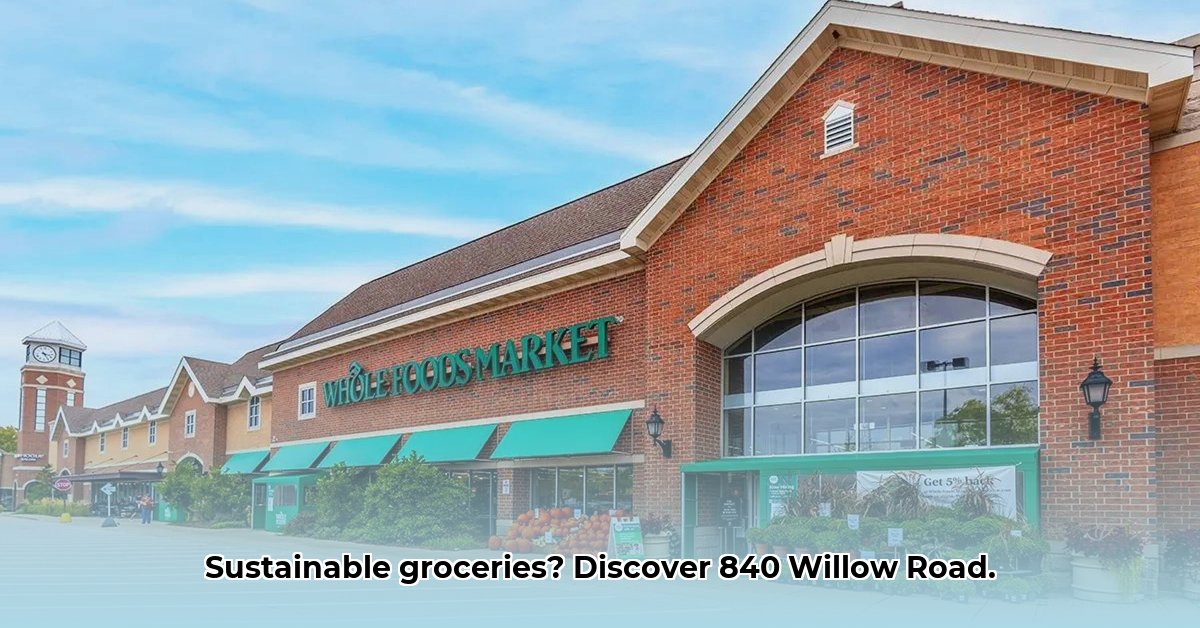
This case study analyzes the sustainability initiatives of the Whole Foods Market located at 840 Willow Road, Northbrook, Illinois, revealing a multifaceted yet incomplete approach to environmentally responsible retail practices. We examine sourcing, in-store practices, Amazon's technological integration, and data transparency to assess the store's overall sustainability performance.
Sustainable Sourcing: A Lack of Transparency
Whole Foods Market Northbrook prominently features labels like "Responsibly Farmed" and "Sustainable Wild Caught." However, the absence of widely recognized third-party certifications (e.g., Marine Stewardship Council, B Corp) significantly undermines the credibility of these claims. While the store may be sourcing responsibly, the lack of verifiable evidence hinders a fair assessment. This lack of transparency raises concerns about the true extent of their commitment to sustainable agriculture and fishing. How can consumers be confident in these claims without independent verification? The absence of such certifications limits the store's ability to convincingly communicate its dedication to sustainable sourcing to its customer base.
In-Store Practices: Small Steps, Uncertain Impact
Several in-store practices suggest a commitment to sustainability. The hot and salad bars could potentially reduce food waste, and the offering of unbleached flour bread demonstrates a consideration for environmentally friendly ingredients. Unfortunately, the absence of quantifiable data on waste reduction, energy consumption, and other key metrics prevents a thorough assessment of their effectiveness. While these actions are commendable, their overall impact on the store's environmental footprint remains unclear. Do these initiatives alone significantly reduce the store's overall environmental impact? Without data analysis, we cannot be certain.
Amazon's Influence: A Double-Edged Sword
Amazon's technology integration presents a complex picture. While features like faster delivery and easier returns could theoretically reduce transportation emissions and packaging waste, these efficiencies may also come with hidden environmental costs. Amazon Prime membership creates inequitable access to these benefits, raising concerns about whether the store's sustainability efforts disproportionately serve a privileged customer base. Furthermore, concerns surrounding data privacy associated with Amazon's vast data collection further complicate this analysis and raise important ethical considerations. Are the efficiency gains outweighed by environmental and ethical concerns related to Amazon's role?
Data Gaps: A Critical Deficiency
The most significant limitation in evaluating Whole Foods Market Northbrook's sustainability is the profound lack of quantifiable data. Without concrete numbers on carbon emissions, waste generated, energy consumption, and water usage, any claims of sustainability are essentially unverifiable. This lack of transparency significantly undermines the credibility of any sustainability assertions. The absence of publicly available key performance indicators (KPIs) makes it virtually impossible to accurately assess their actual environmental performance.
Stakeholder Analysis: A Multifaceted Impact
The store’s sustainability efforts affect various stakeholders differently:
- Whole Foods: Improved brand reputation versus increased costs.
- Consumers: Access to sustainably sourced products vs. higher prices and inequitable access due to Amazon Prime.
- Suppliers: Increased demand for sustainable products but also pressure to meet stricter standards.
- Local Community: Potential economic benefits and healthier food options but limited direct engagement in sustainability initiatives.
- Amazon: Enhanced market share and data-driven optimization but also data privacy concerns and potential exacerbation of existing inequalities.
Recommendations for Enhanced Sustainability
To strengthen its commitment to sustainability, Whole Foods Market Northbrook should prioritize:
Transparency and Data-Driven Assessment: Publish comprehensive, independently verified sustainability reports including quantifiable data on all significant environmental metrics (carbon footprint, waste, etc.). This improved data transparency will be crucial to build trust and credibility.
Supply Chain Transparency: Implement enhanced traceability and sustainability standards throughout the supply chain, ensuring that all claims about sourcing practices are demonstrably accurate and verifiable. Full supply chain transparency is essential for accurate and reliable reporting.
Community Engagement: Actively engage with the local community through educational programs and collaborative initiatives. Community participation in sustainability efforts should become a core part of the overall strategy.
Responsible Technology Integration: Carefully consider the environmental and ethical implications of any technological integration, minimizing data privacy concerns and ensuring equitable access to sustainable options.
Conclusion: A Work in Progress
Whole Foods Market Northbrook demonstrates a commitment to sustainability, but its efforts remain incomplete due to a serious lack of transparency and verifiable data. The store shows some positive initiatives but needs significant improvements in data collection and reporting to truly demonstrate its commitment to environmental responsibility. A data-driven approach and greater transparency are essential for improving its sustainability performance and building consumer trust.